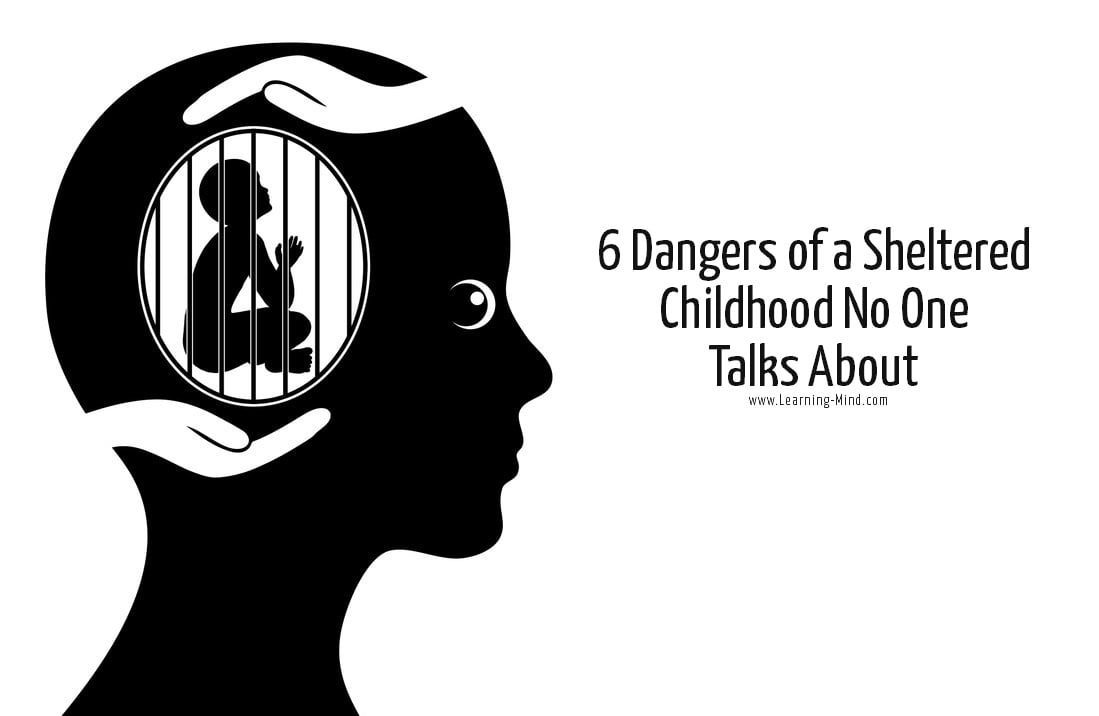6 Dangers of a Sheltered Childhood No One Talks About
Childhood neglect is damaging, but we all know that.

But did you know that a sheltered childhood can also be detrimental to your life as an adult? There are so many ways to raise your child and find balance can be difficult. However, abusive parenting like childhood neglect can leave scars that spread and infect others later in life. But sheltered children can also carry negative aspects into adulthood. Maybe they aren’t scar-like characteristics, but these ‘ways’ can be toxic. So, what’s wrong with protecting and loving your child? Well, nothing. It’s when the protection and love become like a transparent bubble that there’s a problem. Some parents are so afraid of the world and its negative aspects, that they shelter their children in various ways.
They watch the child’s every move, hence the term ‘helicopter parents’. Maybe parents refuse to let their children have friends or stop them from experiencing new things. Whatever it may be, these sheltered children will exhibit effects later in adulthood, and it will not be either. An adult that had an overprotective childhood may experience anxiety.
The connection is the reason why the parent sheltered the child in the first place. An anxious parent will worry constantly about who the child spends time with outside the home, or where the child goes. This anxiety that the parent feels will transfer into the child and remain there as the child grows older. In most cases, the sheltered child will become an anxious adult, who not only suffers from social anxiety but also fights depression because of loneliness. If a child is raised to avoid ‘bad’ things, in adulthood they will attempt to stay away from those things. If they fail, they will experience abnormal amounts of shame.
Their view of what’s really bad will be skewed to reflect how their parent or parents felt. Anything that was instilled in childhood will govern the amount of shame felt as well. It could be debilitating to the adult. Many possibly good opportunities could be missed due to what the adult was raised to believe, and the shame experienced when the adult goes against this belief. Since the adult was taught in childhood that the world was bad, a sheltering tactic, they will always have doubts about people, places, and things. If the world is bad, the adult will have issues with trust, and it doesn’t matter how hard others try to love them or be a friend. Unfortunately, many adults remain alone in life just because they believe there is no goodness. It was what they were taught, so it makes sense to doubt everything. Not all results of sheltering equal timidity or shame. Sometimes sheltering in childhood can lead to an adulthood filled with risk-taking behavior. If a child was monitored and not allowed to do anything fun, as an adult, they may want to make up for the lost time.
The result could be speeding, drinking too much, experimentation with drugs, and promiscuous behavior. Helicopter parenting doesn’t always instill the parent’s beliefs into the adult child. Sometimes it creates quite a rebellious nature.
There are two negative attachment effects that overprotective parenting can cause. One is preoccupied attachment, and the other extreme is dismissive attachment. Preoccupied attachment as an adult is caused by parents who were clingy and overprotective, even to the point of providing too much comfort to the child. This happened even when the child acted out in negative ways. Later in life, in relationships, the overprotected partner will be clingy and possessive. With dismissive attachment as an adult, parents were overprotective, but they also neglected their child’s emotional needs. In adulthood, during relationships, the neglected but overprotected adult will avoid intimacy or any normal emotional attachments to their mate. Both attachment styles are unhealthy and cause insecure characteristics in the adult. It’s strange how low self-esteem can bloom from a sheltered childhood, but it’s true. You see when children are overprotected, parents are saying the child is not able to protect themselves, and they’re not able to do things on their own. Although the parent may not verbally say these things, the messages are clear. As an adult, the overprotected child may have low self-worth because they feel incompetent and unable to navigate life.
The sheltered childhood created an adult that feels like nothing can be accomplished with guidance from someone else. This creates brittle self-esteem that can crumble at the least sign of responsibility. Parenting is difficult. I am a mother, and I’ve been guilty of acting in both neglectful ways and overprotective ways as well. Maybe this article has you thinking too. If so, take a step back and examine your parenting styles. Are you holding on too tight? Are you not paying attention? Both are unhealthy ways to raise a child. Finding balance, while this may be confusing at times, is the only way to raise our next generation of adults. I think I will be re-examining my ways today. How about you?.
Read the full article at the original website
References:
- https://www.learning-mind.com/childhood-emotional-neglect/
- https://www.learning-mind.com/toxic-adult-children-signs/
- https://www.learning-mind.com/why-feel-i-have-no-friends/
- https://pubmed.ncbi.nlm.nih.gov/22659077/
- https://www.learning-mind.com/neglected-social-anxiety-causes/
- https://www.learning-mind.com/toxic-shame-signs/
- https://www.learning-mind.com/mean-world-syndrome-signs/
- https://www.learning-mind.com/sensation-seeking-behavior-science/
- https://www.learning-mind.com/needy-people-signs-manipulation/
- https://www.learning-mind.com/immature-adults-traits-behaviors/
- https://www.learning-mind.com/parenting-styles/
- https://www.learning-mind.com/author/sherrie/
- https://www.learning-mind.com/sheltered-childhood-dangers/
- https://www.learning-mind.com/secretly-unhappy-signs/
- https://www.learning-mind.com/recipe-for-happiness/
- https://www.learning-mind.com/contact/
- https://www.amazon.com/dp/B08LTNJVTZ
